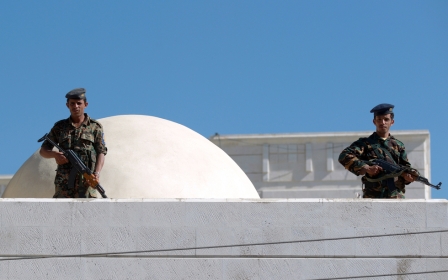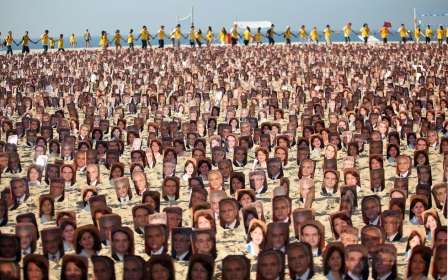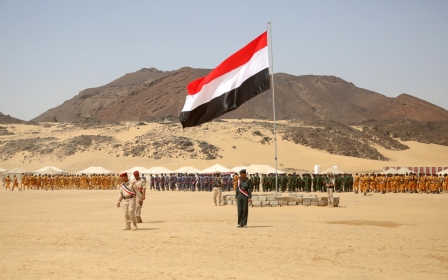Yemen's Baha'i community growing despite persecution
A 31-year-old social activist in Sanaa has been defending the rights of minorities for 10 years, but as the sectarian conflict rages in Yemen, he converted to become a part of a religious minority himself.
Amer (not his real name) grew disgruntled and frustrated with imams who incite Muslims to kill each other. In February 2015, he lost his faith and started identifying as an atheist.
He later adopted the Baha’i faith, a relatively new religion that stresses the oneness of God and global spirituality.
"I continued to be an atheist for two months, but then I started to think about the Baha’i religion. I had already supported some of its members, and I found its principles to be the best,” Amer told Middle East Eye. “The Baha’i faith is a peaceful religion that separates itself from politics.”
Amer knows that the theocratic punishment for Muslims who leave the faith can be execution, so he mostly keeps his religious beliefs to himself.
New MEE newsletter: Jerusalem Dispatch
Sign up to get the latest insights and analysis on Israel-Palestine, alongside Turkey Unpacked and other MEE newsletters
“My Muslim friends think I am an atheist, and this is better for them than conversion to another religion,” he said. “I do not like to be a Muslim by force. Allah gave us a brain to think. We are free in this life to believe in any religion we choose."
Who are the Baha'is
Baha’u’lláh, the son of a Persian government official, established the faith in the 19th century. Bahai’s believe him to be last messenger of God.
They consider the prophets, founders and leading religious figures of older faiths - including Abraham, Krishna, Zoroaster, Moses, Buddha, Jesus, and Muhammad - to be divine messengers, as well.
Baha’i sources, including a US-based website for the followers of the faith, say there are five to seven million Baha’is in more than 200 countries around the world. The seat of the governing body of the faith is located in Haifa, Israel.
Amer participates in the all activities of the Yemeni Baha’i community. He said he was in attendance at a Baha’i meeting at Yemen Good foundation on 10 August when Houthi security forces stormed the gathering and arrested 27 attendees, including women and children.
Amer was one of those detained, but he did not tell the security forces that he is a Baha’i. Instead he said he is an activist who supports minority communities.
"I remained in prison for five days, and then one of my friends assured the authorities that I will no longer participate in such meetings."
The prosecution asked the detainees to pledge that they will not organise or take part in any activities that tell people about the Baha’i faith in public. Most of them were freed under that condition, the spokesperson of Baha’is in Yemen, Abdullah al-Olofi, said.
There are still three Baha’is detained in the National Security Bureau; security forces refused to release them, in addition to one in the Central Prison.
"Muslims choose not to face the mission of Baha’is by dialogue, so they resorted to use violence under the pretext of defending Islam and Muslims from religious deviation,” Olofi said. “Baha’is do not fear prisons. On the contrary, this helps us raise their voice.”
The rise of sectarian conflicts among Yemenis over the past decade has helped Baha’is gain more supporters in different provinces, Olofi said.
“Sectarianism in Yemen forced many people to rethink their commitment to Islam and look for the truth,” he added. “Some have turned to the Baha’i faith because it is a religion that solves the problems of the current situation."
"The arbitrary arrests of Baha’i people for doing nothing more than attending a peaceful community event is completely unjustifiable." -Amnesty International
Since 2005, Yemen’s Baha’i community grew from 100 to 2,000 followers, according to Olofi.
After the 10 August meeting was stormed, human rights activists voiced support for Baha’is, launching a social media campaign demanding the release of the detainees.
On 17 August, Amnesty International urged the Houthis to free the Baha’is arrested for attending the meeting.
"The arbitrary arrests of Baha’i people for doing nothing more than attending a peaceful community event is completely unjustifiable. It is just the latest example of authorities’ persecution of minority faiths,” Magdalena Mughrabi, Amnesty International’s Deputy Director of the Middle East and North Africa Programme, said in a statement.
‘Mercenaries of Israel’
Olofi said the Yemeni government started cracking down on Baha’is after noticing their growing appeal in 2008.
"The government expelled several foreign Baha’is from Yemen in 2008. In 2015, the Baha’is organized their first meeting for the youth in Yemen. It was a week-long, and young people from different provinces attended it," Olofi said.
Hamed Haydara, a follower of the Baha’i faith, was detained in December 2013. The government accused him of trying to convert Muslims on behalf of the Israel, and undermining the independence of the Yemeni state. He remains in Sanaa's Central Prison.
A source in the Interior Ministry said Baha’is are arrested for security reasons. The government suspects that they are working for Israel.
"The main religious centre for Baha’is is located in Haifa, and all Baha’is around the world obey the Israeli government,” the source told MEE on condition of anonymity. “They are willing to create chaos in Yemen. Security forces arrested the Baha’is and then released them after guarantees that they will not gather publicly again."
He added that the security forces did not ban Baha’is from practicing their rituals, but they prevented them to attracting attention in public because Yemen is a Muslim country.
However, Olofi denied the claim that Baha’is are agents of Israel or any other country, saying that followers of the faith have humanitarian principles.
He added that they are far from being a security problem because their mission is to spread peace globally.
Political and sectarian rivals in Yemen seem to differ on most issues but they find agreement in cracking down on Baha’is.
Sheik Sabri Aqlan, the Imam of al-Rahma Mosque in Taiz, said that he is against the Houthis "who are killing civilians everywhere in Yemen", but this does not mean he is against them as they attempt to stop the spread of Baha’ism.
"Islam forbids conversion to any other religion, and those people who have left Islam to become Baha’i have to be arrested and tried," Aqlan told MEE.
He said Baha’is in Yemen were originally Muslim.
"Islam asks us to live peacefully with people from other religions, but it does not allow Muslims to abandon their faith,” Aqlan added.
Amer, the Baha’i convert, said even the prospect of execution has not stopped some young Yemenis from adopting the “peaceful Baha’i faith”.
Middle East Eye delivers independent and unrivalled coverage and analysis of the Middle East, North Africa and beyond. To learn more about republishing this content and the associated fees, please fill out this form. More about MEE can be found here.




